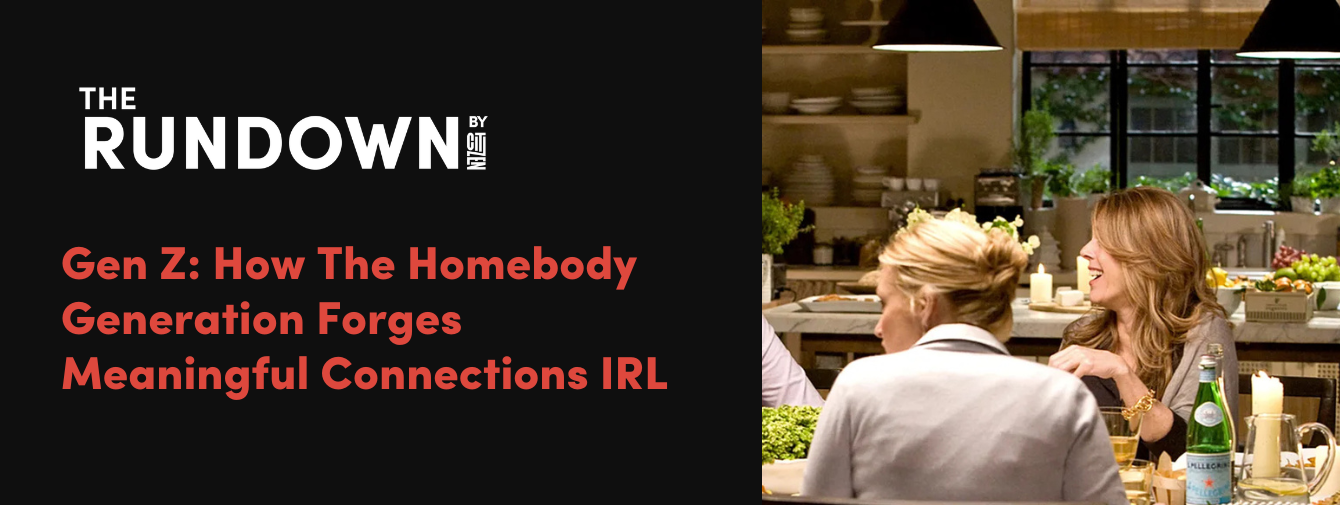Gen Z: How The “Homebody Generation” Forges Meaningful Connections IRL
December 10, 2024

There’s a lot of conflicting information about Gen Z, their desire for connection, and whether they’re willing to venture offscreen to forge the IRL connections they’re craving. Dubbed the “homebody generation”, on the surface there’s some conflicting information about young adults: sick of meeting people online yet unable to disconnect, social by nature but over bars and restaurants. Surprise, humans contain multitudes! Especially those forming their own identities in early adulthood. That said, many Gen Zs are threading this needle in a particularly interesting way: transforming their most intimate spaces into an optimal environment to build the meaningful connections they seek: who says the first place can’t become the third place? Come on over.
The actual anti-social social club
The homebody generation label doesn’t mean a desire to be by themselves – according to the 2024 Citizen Connections Report, the majority of Gen Z consider themselves social or strong connectors (57%), meaning they feel their best when they’re with others, and seek out these experiences. While we see this generation spending more time at home, they still crave connection & prioritize a third place. However, when it comes to a space where they can best forge those connections, they are often reimagining where this happens, while other generations set out into the wider world to find it. Gen Z is creating “third place moments” at home, driving a hosting renaissance in a way that celebrates both their physical and online worlds.
Staying home doesn’t mean what it used to.
The majority of Gen Zs do have a third place in the traditional sense, and of those, 9 in 10 say they’d give up major quality of life indicators to keep theirs. But, according to the 2024 Citizen Connections Report, they’re also most likely to say their third place is missing major features (food & drink, accessibility, low/ no costs) that make them ideal for building & fostering social connections. As a generation who’s experienced major milestones from home, and are in a lifestage where self discovery and expression is paramount, it makes sense that this home is becoming their bar, coffee shop, pilates studio, and more. According to the 4A’s, Gen Z will gravitate towards whatever feels most meaningful & memorable, and gravitates towards ways to explore shared interests vs traditional third places like bars & restaurants. Because this cohort is invested in making home the place where they feel most authentic, safe and fulfilled, it makes sense that they’re inviting the social occasions millennials tend to find outside the home, into theirs. Searches for Nancy Meyers core and dopamine decor are sky high, and themed dinner parties have seen a 6000% search increase through summer 2024 according to Pinterest.
But it’s not just about the physical: while hosting at home satisfies the intimate, authentic space for social connections that feel truly meaningful for Gen Z, they’re also able to seamlessly include their online universe in the experience, sharing unfiltered but highly curated moments from their home café drop-in, Book Club or coastal dinner party. Bringing social occasions home means they can make their best memories in a space that allows them to showcase who they are, both to those in the room and their broader friends and followers online.
What’s keeping Gen Z home – brand considerations:
- Anxiety is REAL: for this generation, home is their happy place. To welcome this cohort out, traditional third places need to adapt and understand that many young adults are more comfortable at home and behind a screen, and work to bridge that gap in thoughtful ways with relevant and familiar cues (source).
- Money is tight: For many, income hasn’t kept up with the cost of going out / socializing at spots where you have to spend $$$ to spend time. Think about how your brand can lower the barrier to exit (their own front door) if you want to make broadening their horizons worthwhile (source).
- Self expression and shared interests is key: these folks want to spend time with friends and family that they’ll all cherish. They are all about romanticizing the mundane, & TikTok helps project this idealism as well as their own aesthetic touch (source). Consider themes that your audience connects to, and how to help them bring those worlds to life.
